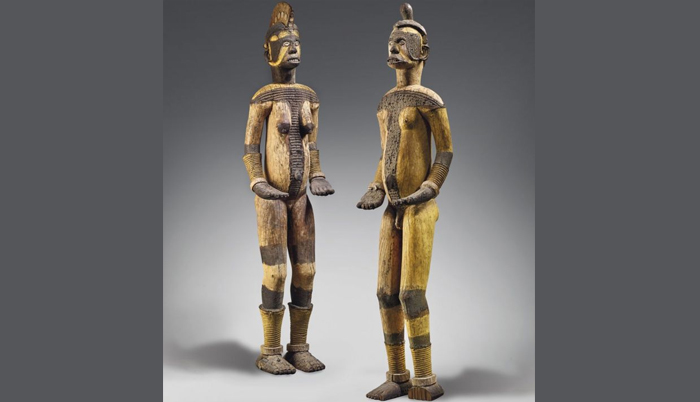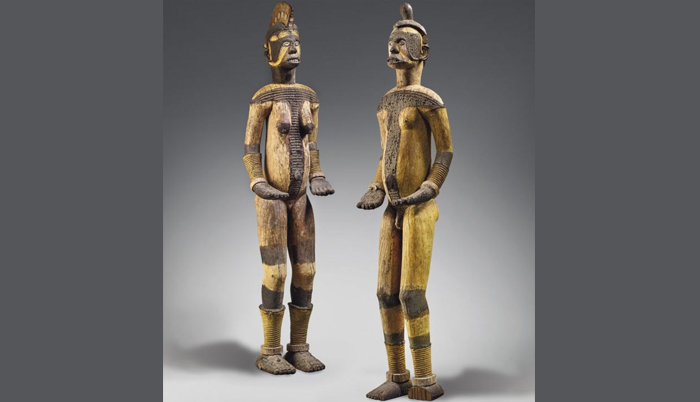
The wooden objects, one male and one female, represent deities from the Igbo community
ABUJA/PARIS, June 30 (NNN-AGENCIES) —Nigeria is “saddened” by the sale of two sculptures belonging to the south-eastern Igbo community, an official from the Nigerian National Commission for Museums and Monuments, has said.
A prominent art historian had called on the renowned auction house, Christie’s, to cancel the sale.
Prof Chika Okeke-Agulu said the two objects were “looted” from shrines during the civil war in the late 1960s.
The items were sold for just under $240,000 in Paris.
Christie’s rejected the claim that the sculptures were stolen, saying the Monday sale was perfectly legal.
The wooden objects about 1.5 metres high, one male and one female, represent deities from the Igbo community, their hands face upwards waiting to receive sacrifices and gifts.
“Christie’s ought not be dealing in Nigerian antiquities that were probably taken out at a time of conflict, contrary to the Hague Convention of 1954,” Babatunde Adebiyi, legal adviser for the Nigerian National Commission for Museums and Monuments, said, adding that Nigeria “was saddened” by the sale.
The Hague Convention of 1954 was adopted to protect cultural property in the event of armed conflict. Nigeria joined the convention in 1961.
Prior to this Nigeria already had an antiquities ordinance law which made the trade of stolen cultural artefacts illegal, which was adopted in 1953.
The 1970 Unesco convention also banned the international trade in stolen artefacts.
Prof Okeke-Agulu from Princeton University says the objects were looted from communal shrines in his native Anambra state, with the help of local conspirators.
He said they could not have been acquired legally because they were removed during the 1960s Biafran civil war, when the Igbo community attempted to secede from Nigeria.
He accused Christie’s and other art collectors of “expropriation”.
Christie has defended the auction.
“The auction house believes there is no evidence these statues were removed from their original location by someone who was not local to the area, or that the area they came from at the time they were acquired was part of the conflict at the time,” it said in a statement.
“Our understanding is that even prior to the conflict, local agents were trading in objects such as these and they were starting to circulate more widely,” it said.
It added that at no stage “has there been any suggestion that these statues were subject to improper export”.
According to Christie’s, the sculptures were acquired by Jacques Kerchache, a French art collector and a close adviser to former French President Jacques Chirac.
The statues remained in Kerchache’s private collection until his death in 2001.
Back in 2018 France launched a report calling for thousands of African artefacts in its museums to be returned to the continent.
While President Emmanuel Macron pledged to repatriate African objects, questions remain over how the policy will be implemented.
Calls for the repatriation of African artefacts have grown in recent years, with the #BlackLivesMatter protests reigniting those demands.
An online petition with over 2,000 signatories had called for the sale of the Igbo sculptures be to cancelled. — NNN-AGENCIES






